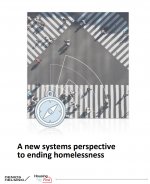
A new systems perspective to ending homelessness
Omschrijving
Homelessness is caused by a complex set of interrelated issues, ranging from lack of affordable housing and poverty to mental health and addiction. Housing First (HF) is a unique model that aims to tackle homelessness at a large scale by combining two types of interventions: unconditional rehousing, and adequate provision of non-mandatory support services.
The HF model has over time gained ground around Europe, showing to have the potential to successfully tackle homelessness in a variety of different contexts. However, this has not been the case everywhere. There are contexts in which, despite the deployment of HF, we have seen an increase in homelessness. Homelessness has been on the rise in most of the European Union for a decade. Based on the few estimates available, +700,000 homeless people were counted in the European Union before the outbreak of the Covid-19 pandemic – a number which would represent a 70% increase in ten years.
Achieving a successful decrease in homelessness – as well as preventing it from happening in the first place – would require structural and operational changes in the systems surrounding homeless people. Yet, in many of the countries where HF has been deployed so far, the pace of change within homelessness policies have not always been capable of keeping up with the growing need of new solutions in face of great societal challenges – such as mass migration and increased inequalities.
While HF holds great potential to enable systems change in homelessness, it also comes with a risk of being interpreted and deployed simply as a mere housing management tool5 . With this think piece, we aim to contrast this narrow view with a new perspective – one aiming to shift the debate on HF from whether it works, to how it can enable wider change.
Grounding our analysis in systems thinking, we engaged decision-makers, advocates, experts and practitioners of HF through interviews and workshops in search of meaningful ways to do so. As a result, this think piece aims to uncover and illustrate how seeing HF through the lens of governance – rather than policy – can provide us with a compass to navigate the complexity of homelessness, and learn how to advance the ambitious goal of eliminating it regardless of the situation a country may face.
While the journey towards systems change may be long, we believe that through this approach much more can be done to better leverage HF and make ungoverned homelessness a governed phenomenon.
Juha Kaakinen, Y Foundation
